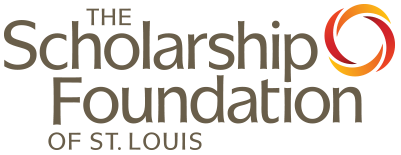The Scholarship Foundation of St. Louis offers a variety of workshops and one-on-one assistance to students and families to reduce confusion and clarify the processes associated with securing financial aid for postsecondary education.
Members of The Scholarship Foundation’s Student Advising Program provide free workshops during the year at Foundation offices in St. Louis and at high schools, community colleges, and community organizations throughout the St. Louis region. All workshops are free and open to the public.
Students and families who desire to schedule a free one-on-one appointment with a Student Advisor for assistance with completing a FAFSA or The Scholarship Foundation’s application for interest-free, fee-free student loans and grants are asked to contact the Foundation at (314) 725-7990 or info@sfstl.org.
Financial Aid Basics
This workshop introduces students and parents to the basics of paying for higher education and helps them identify people, organizations, and sources of information that can help them as they prepare to address the financial challenges.
The workshop reviews the various federal and state aid programs available to students, discusses eligibility requirements, explains the best ways to search for financial assistance, and shows families how federal programs and educational institutions calculate financial need.
FAFSA
This workshop explains the Free Application for Federal Student Aid (FAFSA), including the part it plays in the application process and why it is important to complete the form accurately and submit it as early as possible when seeking financial aid.
Although the FAFSA is much less complex than it used to be, there still is much to learn about completing and submitting this form, which is a mandatory part of applying for virtually all financial aid programs.
Workshop materials address frequently asked questions, troubleshoot some unique scenarios, and make recommendations for handling other special circumstances. The presentation and accompanying workbook walk families through the FAFSA one page at a time, pointing out specific areas that tend to create confusion.
Understanding Financial Aid Award Letters
Educational institutions typically send financial aid award letters to applicants in early to mid-April. The letters describe the financial aid package the institution is offering the student, information that is essential in determining whether the student can afford to attend. But these letters also can cause confusion and misunderstanding, because a school that appears to be the least costly is not necessarily the most affordable.
Determining affordability requires careful comparisons of different schools’ financial aid packages, and this workshop explains how to do that. It shows how to review both the amount and kind of financial aid being offered, as well as any remaining expense gap that a student and family would have to cover on their own, most often by taking out student loans and going into debt.
The accompanying workbook includes a sample of a completed comparison form that illustrates how best to compare the information in financial aid award letters. It also contains a blank comparison form that families can use in comparing the award letters they actually receive.
FAFSA Completion Assistance
Student Advisors support local efforts to assist students in filing the FAFSA in many ways. Advisors volunteer at local FAFSA Frenzy sites, providing expertise to students and their families in attendance. Additionally, students may request a one-on-one appointment with an Advisor, so that they may receive individualized assistance with completing and submitting the FAFSA, as well as information and guidance on what comes next in the financial aid process.
Application Completion Assistance
Students needing help with an application to The Scholarship Foundation’s interest-free, fee-free loan and grant programs may contact the Foundation and schedule an individual appointment with an Advisor. Students can receive personalized assistance with completing and submitting the application and all supporting materials. Staff are also available to answer specific questions about program requirements and the financial aid process.

